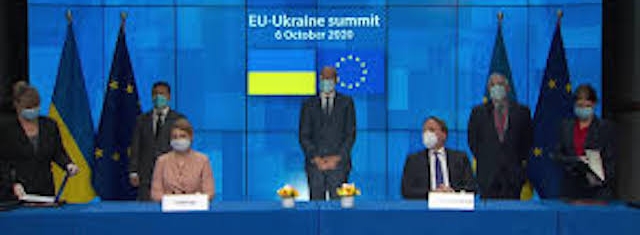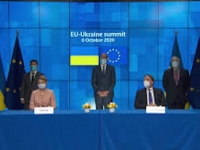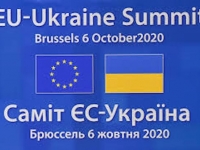Politics
THE 22nd BILATERAL SUMMIT BETWEEN EU & UKRAIN TO DISCUSS ECONOMIC INTEGRATION W
WITH EU HELD ON 6 OCT 20

Charles Michel & Pdt Zelensky (Source: European Council )
USPA NEWS -
The 22nd summit between the European Union and Ukraine was held in Brussels on Tuesday 6 October 2020. This is the first bilateral summit held in Brussels since the outbreak of the COVID-19 pandemic. It is also the first bilateral EU-Ukraine Summit with the participation of President of the European Council Charles Michel and High Representative of the EU for Foreign Affairs and Security Policy Josep Borrell, who will represent the European Commission. Ukraine will be represented by President Volodymyr Zelenskyy. Leaders discussed the way forward with EU-Ukraine relations, including the strengthening of Ukraine´s political association, economic integration and sectorial cooperation with the European Union on the basis of the Association Agreement (AA/DCFTA). Leaders will examine the handling of the COVID-19 pandemic and its socio-economic impact. They will also discuss the reforms in Ukraine, in particular on rule of law and judiciary, the fight against corruption, health and greening the economy.
Leaders are also to discuss the ongoing conflict in eastern Ukraine, the implementation of the Minsk agreements, the consequences of the illegal annexation of Crimea and Sevastopol by the Russian Federation, and further regional and foreign policy issues. The Summit is also be the opportunity for the signature of three support programmes: EU4ResilientRegions, Civil Society Facility Ukraine and Climate package for a sustainable economy.
COVID-19-----------------------------------------------------------------------------------------------------------------------------------------
The summit takes place in the context of the COVID-19 pandemic whose socio-economic impact has already been significant. The EU has been by far the largest supporter of Ukraine, immediately mobilising €190 million as support package and €1.2 billion in the form of macro-financial assistance to tackle COVID-19 and its socioeconomic consequences.
Leaders will reaffirm the strength of the relations between the EU and Ukraine, shown by their unity, solidarity and mutual commitment in the face of the COVID-19 pandemic. They will emphasise the need for global solidarity, cooperation and effective multilateralism through relevant international organisms, including the WHO. They will also call for the future COVID-19 VACCINE TO BECOME A GLOBAL COMMON GOOD AT AFFORDABLE PRICES------------------------------
Implementation of the EU-Ukraine Association Agreement / DFCTA and the related reform agenda : Leaders will reaffirm their commitment to strengthening the political association and economic integration of Ukraine with the EU and welcome the results achieved in the implementation of the AA/DCFTA. The DCFTA has supported the increase of bilateral trade flows by 65% since its entry into force in January 2016, making the EU as Ukraine's main trading partner and main market for Ukrainian exports. Leaders will recognise the progress made by Ukraine in its reform process and agree on the need to further accelerate the efforts. They will welcome the launch of the land reform, the adoption of the banking resolution and efforts with regard to decentralisation and strengthening local self- governance. Leaders will agree on the importance of stepping up the efforts to reform the judiciary system (including the High Council of Justice), strengthen the rule of law and fight against corruption. They will welcome the commitment of Ukraine to fight against vested interests ("de-oligarchisation") and recall the need to further strengthen media pluralism.
They also stress the importance of Ukraine implementing all policies agreed within the EU macro-financial assistance programme and the International Monetary Fund (IMF). The EU will confirm its support to Ukraine in its fight against cyber-threats and disinformation. Leaders will agree to launch a cyber-dialogue. The EU will also underline the important roles played by independent media and civil society in building Ukraine´s resilience. Leaders also discuss further ways to intensify the implementation of the Association Agreement, and, within this framework, further enhance Ukraine´s regulatory approximation with the EU acquis and gradual economic integration as well as dialogue where appropriate in sectors such as the digital single market, trade facilitation, customs cooperation and justice and home affairs. The EU will welcome Ukraine´s ambition to approximate its policies and legislation with the European Green Deal, and stress the importance of making progress with Ukraine´s commitments in the areas of climate change, environment, marine ecosystem, education, energy, transport and agriculture. Leaders are also expected to discuss how to improve people-to-people contacts between Ukraine, the EU and other countries of the Eastern partnership and welcome the successful efforts to implement a visa-free regime for Ukrainian citizens. EU-Ukraine trade (European Commission)“¨Support Group for Ukraine (European Commission) Eastern Partnership
FOREIGN AND SECURITY POLICY ISSUES--------------------------------------------------------------------------------------------
The Summit will take place against the backdrop of the continued violation of Ukraine's sovereignty and territorial integrity and the illegal annexation of Crimea and Sevastopol by Russia. Leaders will reaffirm the EU's support for Ukraine's independence, sovereignty and territorial integrity within its internationally recognised borders and condemn Russian acts of aggression against Ukraine. Leaders will condemn the illegal annexation of Crimea and Sevastopol by Russia, the militarisation and the deteriorating human rights situation in the peninsula. They will also condemn the voting procedures on constitutional amendments of the Russian Federation concluded on 1 July 2020, that took place in the Crimean peninsula, in violation of international law and the election of the so- called “Governor of Sevastopol“ on 13 September 2020. Leaders will reiterate their call on Russia to allow unhindered access of international organisations and human rights actors to the areas currently not under the control of the Government of Ukraine, including in the Crimean peninsula, and to respect international law. Leaders will call for the release of all illegally detained and imprisoned Ukrainian citizens in Crimea and Russia, including Crimean Tatar activists. Leaders will continue to call on Russia to ensure unhindered and free passage to and from the Sea of Azov, in accordance with international law.
Leaders will recall their full support to the diplomatic efforts undertaken within the framework of the Normandy Format, the Trilateral Contact Group and OSCE aimed at a sustainable and peaceful resolution of the conflict. They will welcome the renewed engagement by the parties at the Normandy Format Summit last December in Paris and stress the importance of implementing the measures agreed on that occasion in view of the full implementation of the Minsk agreements by all sides, underlining the responsibility of the Russian Federation in this regard. The leaders will underline that the comprehensive and unlimited ceasefire is an achievement that should be preserved. They will urge Russia to use its influence to ensure free and unhindered access of the OSCE Special Monitoring Mission (SMM) to non-government controlled areas of Ukraine. The leaders will also condemn the Russian measures entitling Ukrainian citizens of those areas to apply for Russian citizenship in a simplified manner. The EU recently renewed its economic sanctions on Russia whose duration remains linked to the full implementation of the Minsk agreements. Leaders will agree to continue cooperating to address the socio-economic and humanitarian consequences of the conflict, highlighting the necessity to supply water, electricity and gas across the contact line, facilitate the movement of people and goods and ensure that people living in the areas not under the control of the Ukrainian government continue to enjoy their rights as Ukrainian citizens, according to international law. In the context of the COVID-pandemic, leaders will stress that it is even more essential that humanitarian aid continues to be delivered and that the OSCE Special Monitoring Mission, NGOs, UN agencies and the International Committee of the Red Cross have access to non-government controlled areas. Leaders will underline the importance of pursuing demining activities, including in new areas to be agreed. During the summit, leaders will exchange views on the latest developments in Belarus, other regional and foreign policy issues, the Eastern Partnership, including Nagorno-Karabakh. Source: European Council Before the Summit)
European Council Charles Michel Members States Ukraine President Zelenski Summit Pdt Macron Eu Bielorussia Turkey Karabakh Brexit Covid-19 Rahma Sophia Rachdi Jedi Foster
Liability for this article lies with the author, who also holds the copyright. Editorial content from USPA may be quoted on other websites as long as the quote comprises no more than 5% of the entire text, is marked as such and the source is named (via hyperlink).








